

Transition words and phrases. Chapter 2: Writing Basics, What makes a good sentence? Sentence Writing Learning Objectives By the end of this section, you will be able to: Identify the components of a basic sentence.Identify the four most serious writing errors.
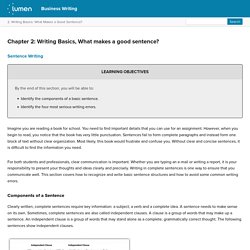
Imagine you are reading a book for school. You need to find important details that you can use for an assignment. For both students and professionals, clear communication is important. Basic Reading and Writing. Introduction.
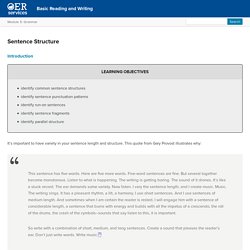
Sentence Structure. Style & Grammar. Quizzes on grammar and syntax – Quizzes on the Language Portal of Canada – Resources of the Language Portal of Canada – Languages – Canadian identity and society – Culture, history and sport – Canada.ca.
Linking words and phrases. Grammar Lesson #1 - Improve Sentence Structure. Learnenglish.britishcouncil. Preparatory subject. Grammar Lesson #1 - Tips to Improve Your Sentence Structure. GMAT Sentence Correction: 8 Most Commonly Tested Errors. GRAMMAR: How to use linking devices to show contrast. Linking words of contrast: BBC Masterclass. Study English - Series 1, Episode 10: Solar House. Everyday Grammar: Sentence Pattern. Agreement and Parallelism. When to Use Articles Before Nouns. Several listeners have written with questions on when to use the definite article “the,” the indefinite article “a,” or neither.
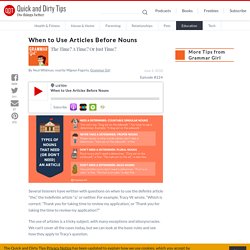
For example, Tracy W. wrote, “Which is correct: ‘Thank you for taking time to review my application,’ or ‘Thank you for taking the time to review my application’?” The use of articles is a tricky subject, with many exceptions and idiosyncrasies. We can’t cover all the cases today, but we can look at the basic rules and see how they apply to Tracy’s question. Nouns That Need Determiners: Countable Singular Nouns We’ll start with some facts about nouns. Common Sentence Mistakes. Some mistakes are common when writing sentences in English.
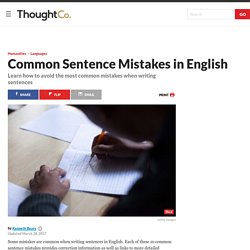
Each of these 10 common sentence mistakes provides correction information as well as links to more detailed information. Noun Clauses in Everyday Speech. From VOA Learning English, this is Everyday Grammar.
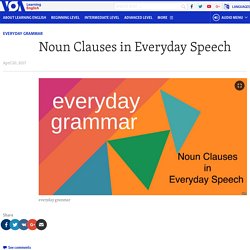
Almost every American has seen or heard of the movie "Forrest Gump. " The film is a touching story about the life of a man who faces many challenges. One of the most famous quotes from “Forrest Gump” is this: My mama always said life was like a box of chocolates. You never know what you're gonna get. These lines might interest you for two reasons. Grammar Girl #655. ‘Myriad’ or ‘Myriad Of’? What Is a Run-On Sentence? While vs during: English In A Minute.
Towson University’s Online Writing Support. Towson University’s Online Writing Support. Cleft sentences. Compound Possession. TOEFL Structure Practice Quiz. English Sentence Structure. Sentence structure. Expressing preference. Skillswise - Sentence grammar. Punctuation. Grammar and Style Brush-Up: Relative Pronouns “In Which” and “When” Knowing the correct words and constructions is key to writing successful GRE essays, as well as statements of purpose, cover letters, and any academic and professional communications you will put forth in the future.
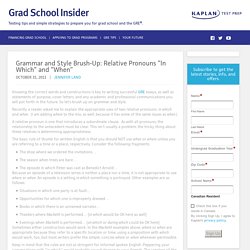
So let’s brush up on grammar and style. Recently a reader asked me to explain the appropriate uses of two relative pronouns: in which and when. (I am adding where to the mix, as well, because it has some of the same issues as when.) A relative pronoun is one that introduces a subordinate clause. As with all pronouns, the relationship to the antecedent must be clear. The basic rule of thumb for written English is that you should NOT use when or where unless you are referring to a time or a place, respectively. The shop where we ordered the invitations…The season when trees are bare…The episode in which Peter was cast as Benedict Arnold… Grammar and Style Brush-Up: Dashes. Knowing the correct words and constructions is key to writing successful GRE essays, as well as statements of purpose, cover letters, and any academic and professional communications you will put forth in the future.

So let’s brush up on grammar and style. Earlier this month, a student asked me about dashes. “What about dashes? Are they too informal for use in a GRE essay?” So I turned to my grammar and style bible, the flagged and bookmarked 1974 edition of Words Into Type, and looked up the appropriate use of the em dash. Dashes can’t really be classified as formal or informal, but they can be classified as correct or incorrect.
To set off an appositive where a comma might be misread. Fortunately for all of us, these situations seldom arise on the GRE. 5 common grammatical errors and how to avoid making them. Do you ever worry about the grammar in your writing, and feel unsure how to fix it?
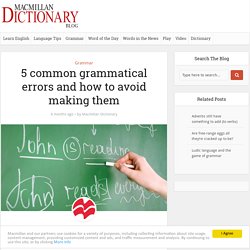
Maybe you don’t have the time or money to get it professionally edited, or this may be overkill for, say, a personal blog post. Luckily, you can take other steps to reduce the chances of grammatical mistakes in your prose. Here we look at five of the most common errors, to help you identify and fix them. Note: an asterisk (*) before a phrase means it’s considered incorrect. Learning English. Learning English. Commas: Oxford, Appositive, Nonrestrictive. Page 1 of 2 Commas are a workhorse punctuation mark.
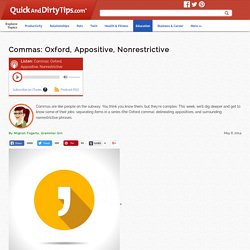
They’re like the people you ride with on the subway every day, the delivery guy who comes by your office, and the parents of your children’s classmates—you see them so often that you think you know them just from sheer exposure. Rarely does a paragraph go by in which you don’t encounter a comma. But like those familiar strangers, commas are complex. SentPatt. Just about all sentences in the English language fall into ten patterns determined by the presence and functions of nouns, verbs, adjectives, and adverbs.
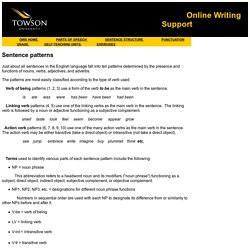
The patterns are most easily classified according to the type of verb used: Verb of being patterns (1, 2, 3) use a form of the verb to be as the main verb in the sentence. is are was were has been have been had been Linking verb patterns (4, 5) use one of the linking verbs as the main verb in the sentence. The linking verb is followed by a noun or adjective functioning as a subjective complement. smell taste look feel seem become appear grow.
Definition and Examples of "Wh-"-Clauses in English. In English grammar, a "wh"-clause is a subordinate clause that's introduced by one of the wh-words (what, who, which, when, where, why, how). Wh-clauses can function as subjects, objects, or complements. "An important aspect of wh-clauses," notes Geoffrey Leech, "is that they require the wh-element to be placed at the beginning of the clause, even if this means changing the normal order of subject, verb, object and so on" (A Glossary of English Grammar, 2010). Examples and Observations Here are some examples of the wh-clause from other writers: "I knew that Jorge was happy, and I thought I knew what was on his mind. " Pseudo-Cleft Sentences With Wh-Clauses. Pronoun Errors. Modifiers.
Sentence structure. Simple sentences: A simple sentence has only one clause: The children were laughing. John wanted a new bicycle. All the girls are learning English. The Norton FIELD GUIDE To WRITING. The Norton FIELD GUIDE To WRITING. Linkers: Time (Past) / first, then, after that, etc. Like / Hate & Like To / Hate to. The Norton FIELD GUIDE To WRITING.